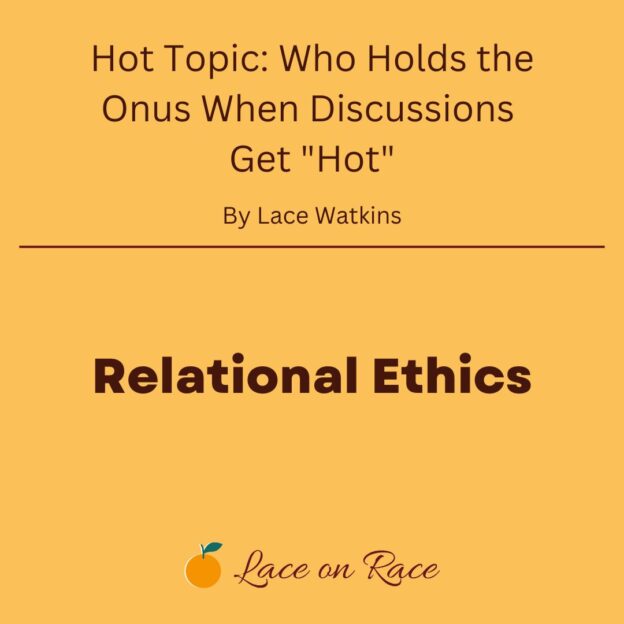Relational Ethics with Lace on Race
On my personal feed today, someone asked why it is that, so often, people seem to get ‘all up in their feels’ and then even perhaps get argumentative or hostile when an innocuous question is posed.
I was dismayed by most of the answers, most of which seemed to focus on blaming the listener or reader. A lot of answers were given: ‘that’s a them problem, not a you problem’; ‘projection’; ‘conflict avoidance’ and the like.
It eventually devolved, as it often does, with someone proclaiming that (paraphrased) ‘I am convinced that there is no such thing as productive and fruitful exchanges with others on social media [and, I also assume in offline lives as well]. Far too many variables. It’s almost impossible with the cohort of like minded, intelligent people in this group’.
As you might guess, I hold a different opinion/conviction, saying (since these are my own words, this is a direct quote):
Quietly: I disagree. I helm an almost exclusively online community where deep relationship and abiding and rigorous dialog happens.
My staff and leadership–and the community we serve– are all over the country. I even have two in LoR leadership who are international.
So ya, I think it’s definitely possible–and I also think there needs to be an element of the intentional and of the relational, both of which I feel is the ‘secret sauce’ that needs to be poured [liberally] over every encounter or engagement, on or off line.
I agree with you about variables, which is why I try to reduce them. So I talk a lot about how one can say anything, but not in any old way, and, [like I have often said], that the speaker or writer is, at least initially, responsible for how their words are received. I actually have guidelines, which I spell out, as well as a mechanism for repair.
The thing is, that relatively few people want to go to all that work. They want to shoot their shots as they drive by. When that is applied to provocative or incendiary queries–it feels less like an invitation to engage, than it feels like someone lobbed a pipe bomb.
People who then feel like they got hit in the eye with shrapnel could very well, and they very well should, cry foul.
But people really do tend to say incendiary things, and do often pose provocative questions, and then are surprised when things go sideways. Why so?
Welp. There is no such thing as a purely innocuous question. This needs to be deeply acknowledged.
I think sometimes it’s tone, or context (or lack of same), but usually I think it’s in the way the query is worded.
Whether or not it’s remembered, or even acknowledged, there is no such thing as a truly neutral query; just the act of posing the question in and of itself can speak to subtle bias or agenda, however covert. This puts the Other in a reacting stance–they are indeed reacting to what has been laid in front of them.
I am indeed of the opinion that the responsibility to people who are receiving either spoken word or written word is on the sender.
The person who is doing the speaking or writing has the onus of making themselves understandable and setting the conditions for people to relate to what they’re saying with a minimum of negative activation or triggering.
A couple paragraphs ago, I mentioned that the person contemplating the query is in a reacting stance–which is as neutral a term as I could come up with. But reacting is a very short leap to reactive/defensive. And this: as much as people are reacting to/confronting the query, they are also reacting to/confronting the query maker.
I do think that often it is more than possible for people to discern where the questioner is coming from, however covertly or indirectly; and the way the query is worded speaks often to bias or an opinion held by the questioner, and also a clear preference for what the ‘right’ answer might be.
That’s why surveys are so funky; most of the time they’re worded so (very) badly.
So yeah, particularly if I’m going to say or ask something that could be considered incendiary, I am very careful with how I phrase.
And particularly if I want conversation where people are engaged in a positive way as opposed to being defensive or in any way combative. I think one can set up a question that guarantees a fight. Conversely, I deeply feel that one can set up a question that facilitates true meaning–and true meeting.
I feel that asking a question, any question really, is sometimes less about the question and more about creating a safe container for which inquiry and struggling and wrestling with the material, and with other people who are also wrestling with the material can feel that their voices will be heard without ridicule or humiliation, that no one voice has Primacy over any other, and this is meant and a spirit of true community and not some sort of smackdown.
That’s why self assessment as to motive, agenda, and desired outcome is crucial. Why it is important to ask if any Losing Strategies are embedded in the query or queries. Interrogating as to whether humiliation or subordination is on the menu. Making sure that all perspectives will be met with respect and inclusion. Ensuring that the community is stronger, and not fractured, by the questions being posed.
I feel strongly that when these elements are considered and enfolded, that any query can be not only tolerated, but embraced. We are here to learn to say and hear hard things. To learn to ask better questions. And to hold steady the Hesed.

Leave a Reply